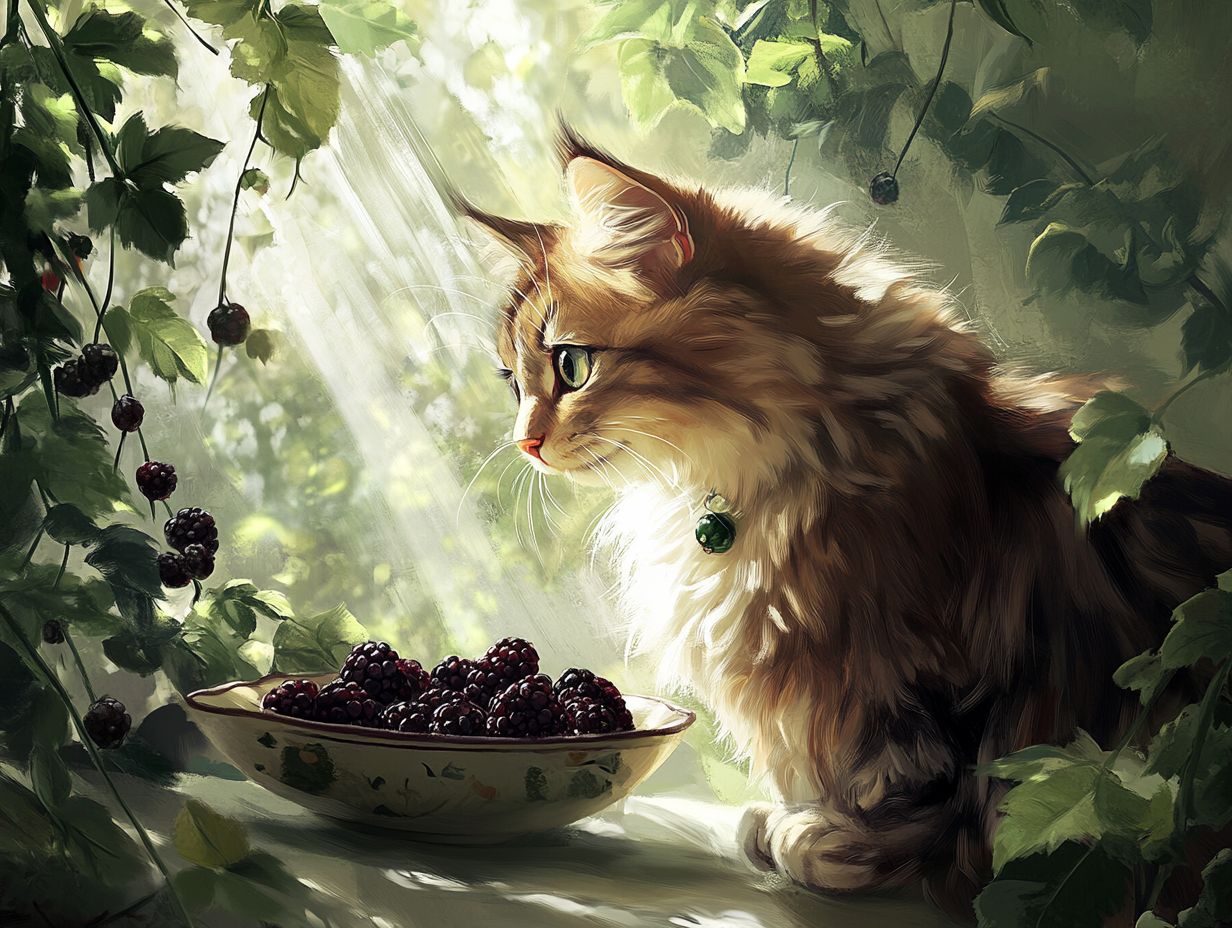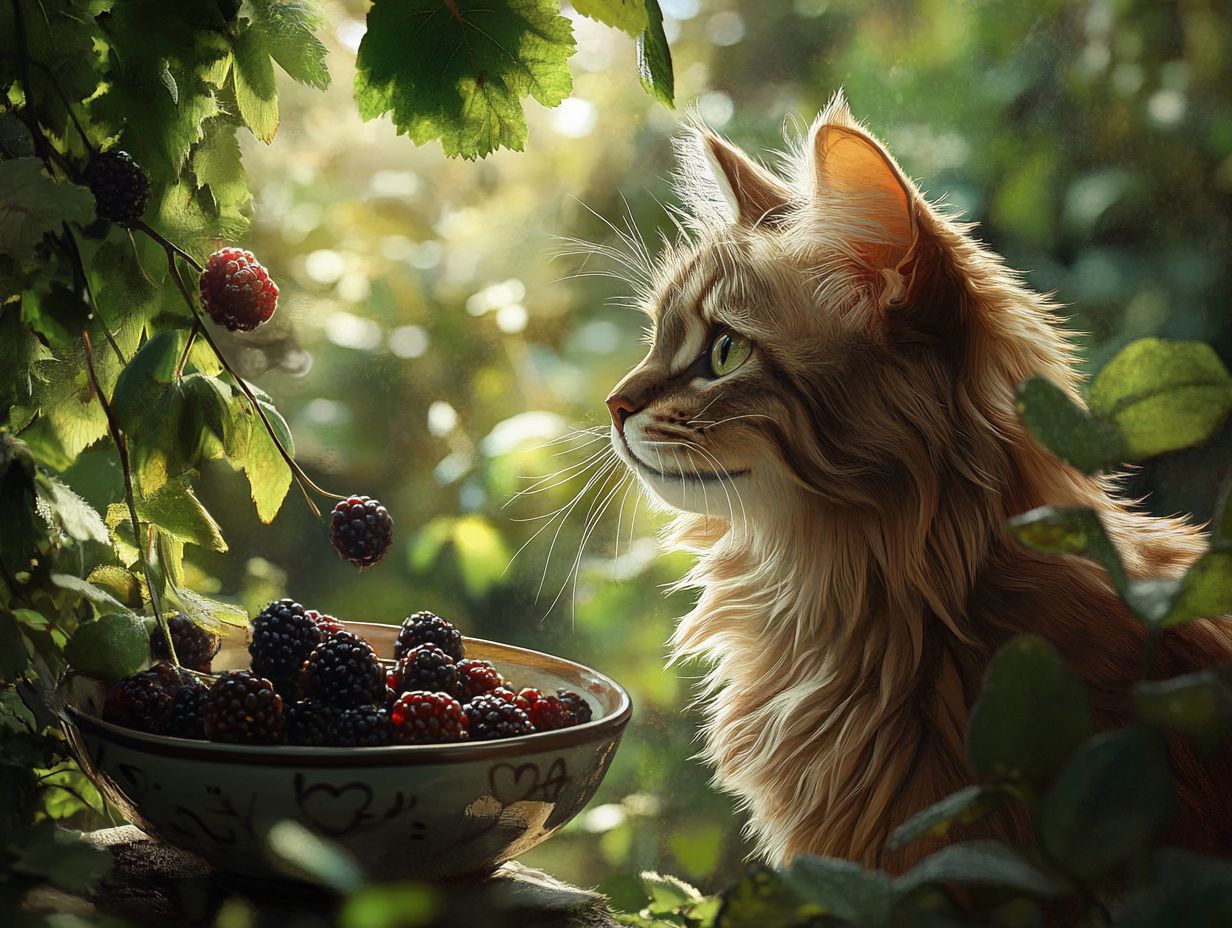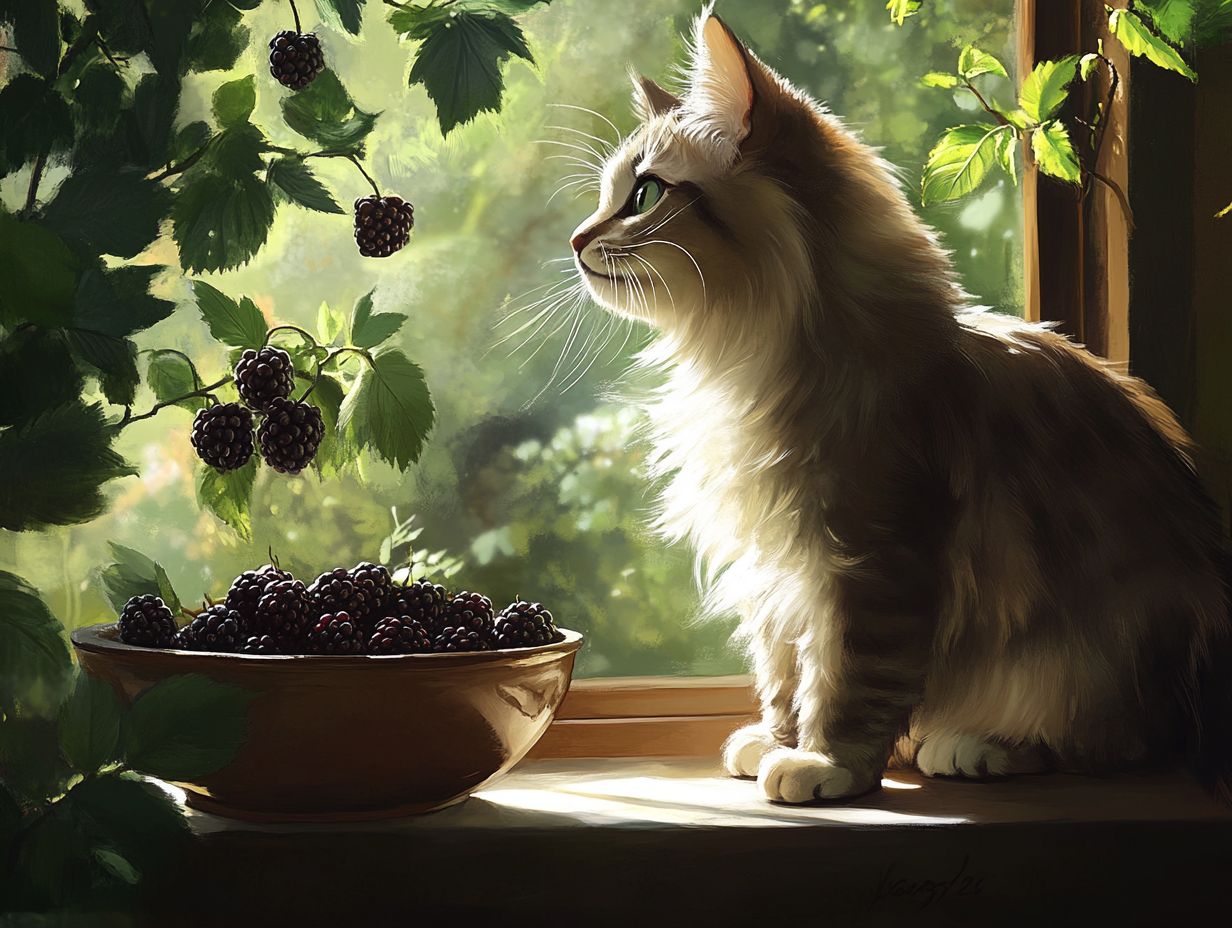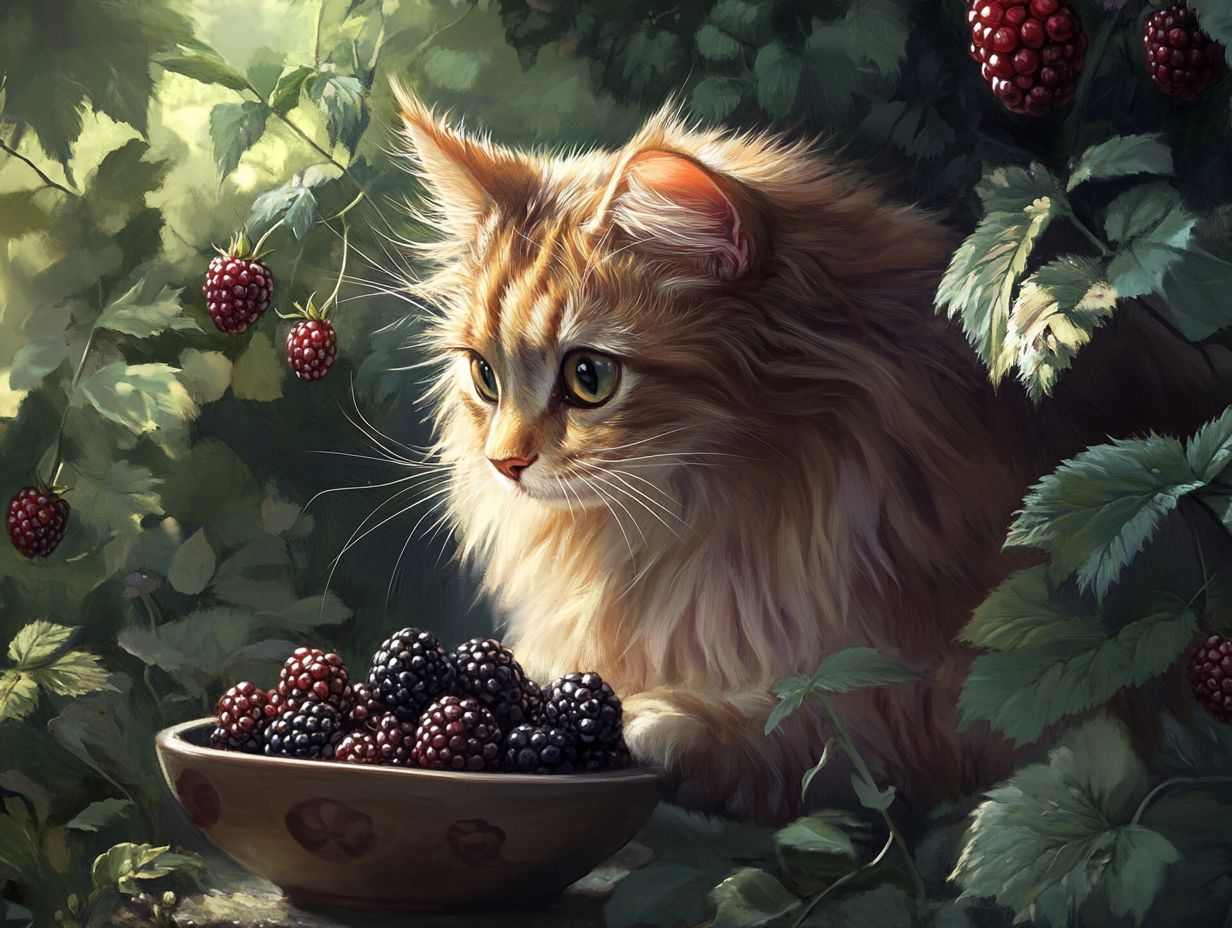Key Points on Feeding Blackberries to Cats
- Cats can eat blackberries safely in moderation.
- Blackberries provide beneficial vitamins, antioxidants, and fiber.
- Always consult a veterinarian before introducing new foods.
- Watch for any adverse reactions after feeding.
Yes, cats can eat blackberries in moderation. This article will explore their safety, nutritional benefits, and feeding guidelines!
This article examines the nutritional benefits these berries offer, including essential vitamins, antioxidants, and minerals. Not everything is safe for our pets, so we discuss potential risks, such as digestive upset and allergic reactions.
You’ll find tips for safely serving blackberries to your cat and discover tasty alternatives if you’d prefer to stick with safer fruit options.
Join us as we uncover the ins and outs of blackberries for cats!
Key Takeaways:

- Cats can safely eat blackberries, but in moderation. They provide beneficial vitamins and minerals for feline health and can be a tasty treat for your furry friend.
- Blackberries contain key nutrients such as vitamin C, fiber, and antioxidants that can support your cat’s immune system and digestion. However, it’s important to introduce them slowly and watch for any potential allergic reactions.
- When feeding blackberries to your cat, make sure to wash them thoroughly and remove all stems and leaves. Offer them as a snack, not as a replacement for their balanced diet. Other safe options include blueberries, raspberries, and pumpkin for cats.
Can Cats Safely Consume Blackberries?
The question of whether cats can eat blackberries is significant for pet owners interested in providing a varied and healthy diet for their feline friends. Although cats primarily require protein-rich food, many owners wish to offer fruits as occasional snacks.
While blackberries offer health benefits such as vitamins and fiber, it’s essential to seek veterinary advice to ensure these fruits do not pose choking hazards or disrupt your pet’s digestive function.
Any fruit, including blackberries, can be introduced to a cat’s diet, but portion size is crucial. Whole blackberries are small, posing a choking risk, particularly for smaller breeds or cats that tend to gulp their food. Therefore, consulting with a veterinarian is vital, as they can provide dietary advice tailored to an individual cat’s health and specific conditions.
Moderation is key; offering small pieces can make eating blackberries both safe and enjoyable for cats. Pet owners must ensure that fruits like blackberries do not interfere with their pets’ predominantly carnivorous diet.
Benefits of Blackberries for Cats
Blackberries offer nutritional benefits for cats when given in moderation, providing important vitamins, antioxidants, and fiber that contribute to overall health. This fruit contains essential nutrients for cats, including vitamins C, K, and E, which can help boost the immune system and support digestive function.
Additionally, the antioxidants found in blackberries help combat free radicals, offering long-term health benefits and reducing health risks for your pet.
Key Vitamins and Minerals
- Vitamin C: Boosts the immune system.
- Vitamin K: Crucial for proper blood clotting.
- Vitamin E: Acts as an antioxidant.
- Potassium: Supports nerve and muscle function.
- Fiber: Aids in digestive health and prevents digestive upset.
When consumed in moderation, these nutrients can significantly improve a cat’s health. Their combined effects contribute to various essential functions, such as maintaining strong bones and enhancing immune responses.
Potential Risks of Feeding Blackberries to Cats

When introducing blackberries, watch for any signs of allergic reactions or digestive upset, such as vomiting, diarrhea, or excessive scratching. If any of these occur, discontinue feeding blackberries and consult your veterinarian.
Ultimately, consult your veterinarian before adding new foods to your cat’s diet for optimal health.
While blackberries are generally safe for cats, they should be fed in moderation. Excessive consumption may lead to stomach upset, and the small size of the fruit can present a choking hazard, especially for younger or smaller cats.
Veterinarians often advise caution when introducing new foods into a cat’s diet. It’s important to monitor your cat’s behavior for any adverse reactions and consult with a veterinarian for dietary advice after trying something new.
Potential Allergies
Like humans, cats can experience allergic reactions to certain foods, including blackberries. Therefore, it is essential to exercise caution when introducing new items into a feline’s diet.
Although rare, allergy symptoms in sensitive cats may manifest as stomach upset, skin irritations, or respiratory problems. Affected cats may show signs such as excessive itching, swelling of the face or paws, vomiting, or diarrhea, which can quickly escalate if not addressed.
Pet owners should closely monitor their cats’ behavior after introducing any new foods, including berries. If an allergy is suspected, it is crucial to stop feeding the suspected item immediately and consult a veterinarian. A professional assessment can help identify specific allergens and facilitate appropriate dietary adjustments.
How to Safely Feed Blackberries to Cats
To ensure the safety and health of cats consuming blackberries, proper preparation and serving are essential. First, wash the blackberries thoroughly to remove any chemical residues from their surfaces. Additionally, consider chopping the blackberries into smaller pieces to eliminate potential choking hazards.
To prevent overconsumption, only offer small amounts as an occasional treat—no more than 1-2 berries per serving. It’s also important for owners to monitor their cats for any signs of stomach upset or allergic reactions after they have eaten blackberries.
Tips for Preparation and Serving
To ensure safety, wash blackberries thoroughly to remove any potential chemical residues, and cut them into smaller pieces to avoid choking hazards. Serve blackberries in moderation, as excessive consumption can lead to digestive upset, adversely affecting your cat’s overall health and well-being.
Always keep a close eye on your cat after introducing any new food to check for any negative reactions. It is also advisable to remove any stems or leaves from the blackberries, as these parts are tough and indigestible.
Keeping the portion size small is wise; a few pieces should suffice to satisfy their curiosity without overwhelming their digestive system. The goal is to help your cat develop a positive association with the fruit, so pay attention to their body language while offering this new treat.
By practicing moderation and being observant, you can ensure that blackberry consumption remains a fun and safe experience for your cat.
Alternatives to Blackberries for Cats

If you’re looking for alternatives to blackberries for cats, there are several other fruits and vegetables that are safe and offer similar health benefits without associated risks, such as food poisoning.
Suitable options include strawberries, blueberries, and small pieces of watermelon, as these are generally well-tolerated and provide essential vitamins, antioxidants, fiber, and pet nutrition benefits.
Always consult your veterinarian to ensure that any new food aligns with your cat’s dietary and health requirements. Other fruits and vegetables that can be safely shared with cats include small amounts of strawberries, blueberries, and even cooked vegetables like carrots. These options provide essential vitamins and fiber, allowing pet owners to adhere to safe feeding practices.
Additionally, cucumbers and pumpkin puree can be included in a feline diet, contributing to hydration and promoting digestive health. It is crucial for cat owners to introduce any new foods gradually and to monitor for any adverse reactions.
Consulting with a veterinarian is essential to determine appropriate portion sizes and ensure that any fruit or vegetable added to a cat’s diet aligns with their individual health needs.
Conclusion
In summary, while blackberries can be a tasty treat for cats, it’s important to feed them in moderation, carefully prepare them, and monitor for any adverse effects. Always consult your veterinarian for tailored advice to maintain your cat’s health and well-being.
By making informed choices, pet owners can create a balanced diet that not only pleases their pets but also helps keep your cat healthy and supports their optimal health.
Frequently Asked Questions
Can cats eat blackberries?
Yes, cats can eat blackberries in moderation. While blackberries are not a natural part of a cat’s diet, they can provide some nutritional benefits that complement their carnivorous needs.
What are the nutritional benefits of blackberries for cats?

Blackberries are a good source of antioxidants, vitamins, and minerals such as potassium and magnesium. They also provide fiber, which can aid in digestion for cats. However, it’s important to remember that cats are obligate carnivores and require animal protein as their primary nutrient source.
Are there any risks or dangers in feeding blackberries to cats?
While blackberries are generally safe for cats, there are a few important considerations:
- Always remove the seeds, as they can be a choking hazard and cause digestive upset.
- Some cats may have a sensitivity to blackberries, so introduce them slowly.
- Watch for adverse reactions such as an upset stomach or digestive issues.
How many blackberries can cats safely eat?
Cats should consume no more than one or two small blackberries per week as a treat. They should not make up a large portion of their diet, as feeding blackberries in moderation is key to avoiding health risks such as food poisoning and pet allergies.
Can blackberries be used as a nutritional supplement for a cat’s diet?
No, blackberries should not be used as a supplement for a cat’s diet. While they contain beneficial nutrients like antioxidants, fiber, and vitamins C, K, and E, they do not provide all the necessary vitamins and minerals that a cat needs to thrive. Always consult with a veterinarian for the best diet plan for your cat.
What other fruits and vegetables can cats safely eat?
In addition to blackberries, some other fruits that cats can safely eat include watermelon, apples, strawberries, and bananas. However, it’s important to feed these in moderation and remove any seeds or pits that may be harmful to avoid choking hazards. Always wash fruits thoroughly to remove any chemical residues. For a comprehensive pet nutrition plan, consult PetMD or seek advice from a veterinarian.
Practical Feeding Tips
To safely introduce blackberries to your cat’s diet, follow these steps:
- Start with a small piece of blackberry.
- Observe your cat for any adverse reactions over the next 24 hours.
In conclusion, while blackberries can be a tasty and nutritious treat for cats, moderation is essential. Always prioritize a balanced diet tailored to your cat’s unique needs, and consult your veterinarian for guidance.